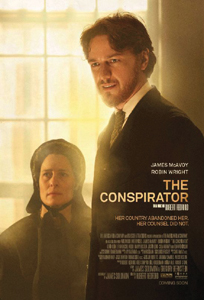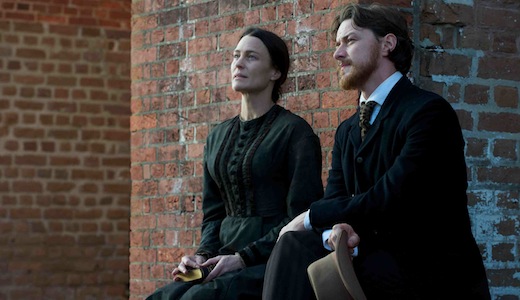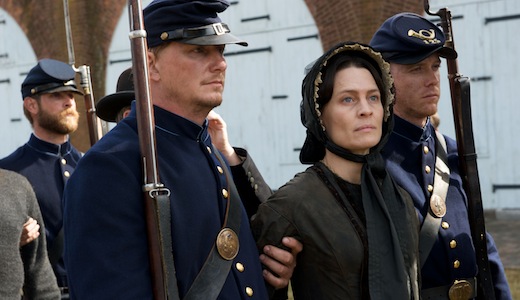 America has been exploring its own history in cinema since the birth of the medium itself. One of the earliest seminal American films is Edwin S. Porter’s The Great Train Robbery (1903), which not only effectively launched the western genre to cinema audiences, it was one of the first examples of narrative storytelling on film. Birth of a Nation (1915) controversially examined the birth of the Ku Klux Klan in a not unflattering light, and so began the journey of American feature films with a political agenda. From All the President’s Men through JFK, revisionist examinations of US history have been as hard-hitting as they are brilliant. With The Conspirator, one of the darkest chapters in American history finds parallels in the modern day.
America has been exploring its own history in cinema since the birth of the medium itself. One of the earliest seminal American films is Edwin S. Porter’s The Great Train Robbery (1903), which not only effectively launched the western genre to cinema audiences, it was one of the first examples of narrative storytelling on film. Birth of a Nation (1915) controversially examined the birth of the Ku Klux Klan in a not unflattering light, and so began the journey of American feature films with a political agenda. From All the President’s Men through JFK, revisionist examinations of US history have been as hard-hitting as they are brilliant. With The Conspirator, one of the darkest chapters in American history finds parallels in the modern day.
Following the assassination of US President Abraham Lincoln by John Wilkes Booth in 1865, seven men and one woman are arrested and charged with conspiring to kill the President, Vice President, and Secretary of State. The woman charged is Mary Surratt (Robin Wright, A Christmas Carol), the owner of the boarding house in which Booth and his fellow conspirators allegedly met, and the mother of a conspirator still on the run. At the behest of former Attorney General and serving US Senator Reverdy Johnson (Tom Wilkinson, The Green Hornet), war hero and attorney Fredrick Aiken (James McAvoy, X-Men: First Class) reluctantly takes the defence case for Surratt. However, with the military tribunal dealing the deck in their own favour, Aiken’s sense of justice is stirred.
Robert Redford has long had a politically active life, and with The Conspirator there is no secret in what he is trying to say. Indeed, if by the end of the film audiences aren’t fuming at the hypocrisy of it all, then pulses will need to be checked. With the death of Lincoln, the film depicts a US military that had almost limitless powers in bringing the perpetrators to their ends at any cost, even justice. Following the events of 11 September 2001, the US Patriot Act gave very similar powers to the government, resulting in the international controversy surrounding indefinite holding pens at Guantanamo Bay. Framed in Newton Thomas Sigel’s (Leap Year) stark photography, bathing everything in a harsh naturally lit glow, Redford aims to shed the light of truth not only on the events of 1865, but of the parallel events in contemporary America. As Wilkinson powerfully states in the film “Our founding fathers drafted a constitution precisely for times like this”. It may seem like a trite sentiment when delivered in the confines of a easy soundbite for the trailer, but it is a sentiment that never had a truer resonance than post-9/11 America. While The Conspirator unabashedly and one-sidedly paints the unfettered military as the enemy, and on this level is dramatically limited, especially within the confines of a legal procedural, it undoubtedly serves as a talking point, as all effective political discourse should.
The real strength of The Conspirator lies in the impeccable casting. Given a meatier role, albeit one that exists largely in the courtroom, James McAvoy reminds us of the strength of his performances in Atonement and The Last Station. Yet it is an almost unrecognisable Robin Wright who impresses the most with her stoic portrayal of the accused, for someone who must know her fate is sealed from the start, but embodies a cautious optimism that keeps the audience buoyed in what can be an often oppressive opposition. Colm Meaney (Get Him to the Greek) is suitably militarian as the prosecutor without being overbearing. It is only Kevin Kline as Edwin Stanton who borders on the caricature and Alexis Bledel as McAvoy’s love interest is nigh on pointless. Yet these serve only as tangents to the main event, an intriguing examination of past and present politics that will linger long after the film fades to black.
[stextbox id=”custom” caption=”The Reel Bits”]A thought-provoking historical courtroom drama that sometimes gets lost in its legal procedural leanings, but carries a message powerful enough to overcome any of its shortcomings.[/stextbox]
[stextbox id=”grey”]![]() USA | 122 minutes | Director: Robert Redford | Starring: James McAvoy, Robin Wright, Tom Wilkinson
USA | 122 minutes | Director: Robert Redford | Starring: James McAvoy, Robin Wright, Tom Wilkinson
[/stextbox]
The Conspirator is released in Australia on 28 July 2011 from Rialto.





